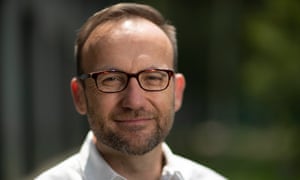The new Australian Greens leader says the party has to connect with coal communities if it wants to be taken seriously
For the first time in the party’s history, the leader of the Australian Greens
sits in the House of Representatives, not in the Senate. If you have to
hold a lower house seat at every election, Adam Bandt says, you have to
listen, and you have to be plugged in to the practical concerns of your
constituents.
In the seat of Melbourne, Bandt spends more time trying to get people’s Centrelink payments restored, or their broken shower working again in public housing, than he spends campaigning on climate change, and his political machine has built his vote in inner city Melbourne, election by election, by connecting with people who wouldn’t normally vote Green, and fixing practical problems.
"This is a transition that has to happen, but it is about people"
While Bandt projects as fiercely ideological, and is, having forged
his philosophy in hard left politics in Victoria, his politics has
always been bread and butter at the local level. This mindset, he
thinks, is the modus operandi for increasing electoral support for the
Greens at a national level – an organisational model that he hopes
pushes the Greens past the arid debate that has persisted since their
founding about whether Australia’s environmental party is a party of
protest or should have aspirations to be a potential party of
government.In the seat of Melbourne, Bandt spends more time trying to get people’s Centrelink payments restored, or their broken shower working again in public housing, than he spends campaigning on climate change, and his political machine has built his vote in inner city Melbourne, election by election, by connecting with people who wouldn’t normally vote Green, and fixing practical problems.
"This is a transition that has to happen, but it is about people"
In Melbourne, the strategy has been simple: reach out to people “who would benefit greatly from Greens policies if they were implemented but haven’t yet heard what our policies are. My strategy [as leader] is going to be about getting to those new groups to explain what it is that we stand for,” Bandt, who took over from fellow Victorian Richard Di Natale this week, tells Guardian Australia.

Bandt has been out in coal communities for the past couple of years, talking about the transition to low-emissions energy, in places like Lithgow and Maitland. “There would be the guys in the high vis vests sitting in the front row with their arms crossed, staring at me all the way through the presentation, and then at the end, they’d come up and say I don’t agree with everything you are saying, but at least you are the only one being honest with us,” he says.
The new Greens leaders says he’ll do more venturing out into hostile country over the coming term. He says the picture of coal workers in the La Trobe valley stays on the wall to remind him who sits in the crosshairs when the Greens campaign for a rapid transition away from coal. “For me, this is a reminder that this is a transition that has to happen, but it is about people”.
Bandt says the progressive side of politics has not yet won the climate war in Australia because it hasn’t stitched together the moral and scientific imperative of trying to avoid the most dangerous impact of climate change with a credible economic transformation story.
“Where things haven’t worked as well as they could for progressive forces in the past is the transition plan needs to be clear, and it needs to be believable,” he says. “There is no point in telling people there may be jobs in unspecified industries in the future. It is incumbent on us to explain how we will look after people in this transition”.
He says he was speaking recently to one of the school strikers, a 17 year old, who told him her anxiety about runaway climate change was now so profound she wouldn’t allow herself to think more than a year ahead.
Bandt says if the environment movement and progressive politics don’t start thinking about how to deliver a grand bargain that connects the fear about change in coal communities with the increasing panic among young people and metropolitan voters about a lack of meaningful action to reduce emissions, it risks “being stuck in anxiety and anger”.
He has opened his period of leadership by talking about a Green New Deal, which he characterises as “a government-led plan of investment and action to build a clean economy and a caring society”. Bandt says the purpose of this reframing of what has been a rancorous debate in Australia is to provide hope that there can be an exit strategy from catastrophe.
A couple of senior members of Labor’s frontbench, Tony Burke and Chris Bowen, have also been signalling tentatively in this territory. The Greens, and Labor tentatively, have been using terminology such as “just transition” in recent election cycles, but Bowen argued recently that rhetoric is less compelling in coal communities than a stimulus package that aims to address both climate change and economic inequality.
Bandt also has his eyes firmly on progressive-leaning Liberal party territory in the inner city.
He says Scott Morrison managed to contain a voter backlash from Liberal supporters in seats like Kooyong and Higgins at the last election by spending large amounts of money on positive messaging about the Coalition and climate change. The prime minister told voters he had climate change under control. “He doesn’t have it under control, and we need to speak to the people Morrison was speaking to and rebut that message”. Bandt says the events of the summer provide the impetus for the Greens to speak more persuasively to small “l” Liberal voters “because people are witnessing this catastrophe for themselves”.
Bandt says he wants to take a “plan heavy” approach to leading the Greens, and his ideal operating conditions are power sharing parliaments that deliver outcomes, like the one he entered in 2010.
The new Greens leader contends, like all of his contemporaries, that his party has no need to apologise for joining with the Coalition to vote down Kevin Rudd’s carbon pollution reduction reduction scheme in 2009 – even though the move has been fiercely criticised for setting back action on climate change for a decade..
Bandt winds the clock forward. He says the Greens legislated a carbon price with Labor only a couple of years later. “I defend the decision that was made at the time, but even if you accept Labor’s argument that we should have done things differently, we did. That’s exactly what happened”.
The new leader, as well as trying to turn a page in the climate wars, inherits a fraught unresolved debate inside his own ranks about how the party selects parliamentary leaders. Di Natale told the party’s national conference in 2016 that the Greens should consider democratising leadership ballots but the model is not yet agreed. Options include the party considering a direct vote of the membership, or a split vote of members and MPs similar to Labor’s model. There is intense frustration at the grassroots level about a lack of progress, with perceptions reform has been stymied by some members of the federal party room.
Bandt chooses his words carefully when asked whether he supports democratisation. He says he’s in favour of a mixed model where the party leadership is determined by a vote split between grassroots membership and the Greens party room, similar to the model Labor has adopted, but he won’t say what the weighting should be. He says he won’t use his position as party leader to try and steer an outcome.

No comments:
Post a Comment